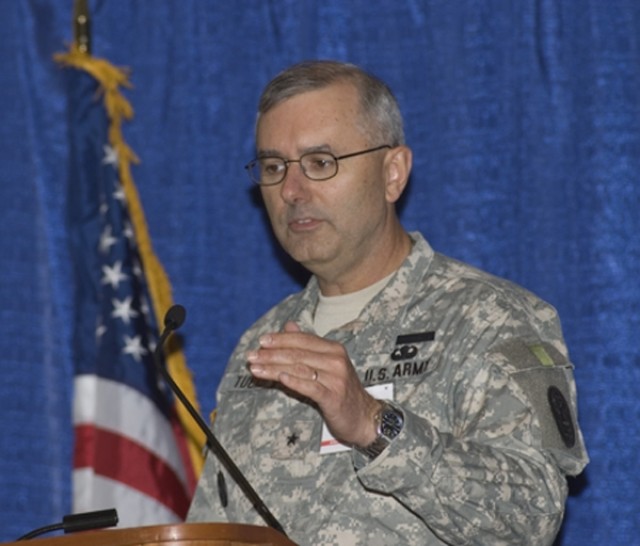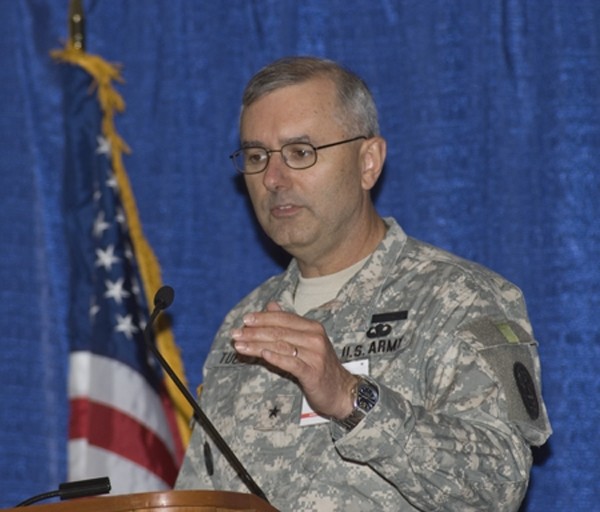WASHINGTON (Army News Service, Nov. 30, 2007) -- One of the Army's top advocates for the care and treatment of its ill and wounded Soldiers and their Families will now serve as assistant surgeon general for warrior care and transition.
The Army has assigned Brig. Gen. Michael S. Tucker, who has been deputy commander of the Army's North Atlantic Regional Medical Command as well as director of the Army Medical Action Plan, known as AMAP, to lead the service's warrior care and transition effort.
Tucker, a two-time combat veteran, has been known by the media as a "bureaucracy buster," and was charged with transforming wounded warrior care in March following news reports a month earlier about substandard living conditions and procedural obstacles for wounded soldiers at Walter Reed Army Medical Center in Washington, D.C.
"As a leader of soldiers, I am humbled by this responsibility and the implications it will have on the force for years to come," said Brig. Gen. Tucker, a 35-year Army veteran. "What we do today to transform the military health care system and respond to the needs of our soldiers and their families - at a time in their lives when they need us most - will shape the force for years to come. Anything other than a complete transformation of the system is unacceptable."
Brig. Gen. Tucker and his staff have spearheaded efforts to create warrior transition units, or WTUs, to give better leadership and supervision to soldiers recovering from wounds, to improve their housing and other service facilities and to establish centers to provide administrative and social-work services for soldiers' and families.
Maj. Gen. Gale S. Pollock, the Army's acting surgeon general, said Soldiers who are recovering from injuries or illnesses have earned the very best service and support that can be provided. She said those warriors have an advocate in Brig. Gen. Tucker, adding that he impresses everyone with his energy and enthusiasm. She said he aggressively tackles important issues and will continue that focus in his new position as assistant surgeon general for warrior care and transition.
While Brig. Gen. Tucker's title has changed, his team remains focused on providing policy and program oversight of the 35 WTUs. In the WTUs, each patient is assigned a squad leader, a case manager and a primary-care manager to make sure the wounded soldier receives appropriate treatment and adequate administrative support, and his or her family's needs are met.
Brig. Gen. Tucker, a former drill sergeant, said that during his career he has faced many challenges, but the personal responsibility he feels for improving the lives of his fellow Soldiers is what drives him to bust through the bureaucracy.
He is quick to credit the team of Army physicians, nurses, social workers, benefits counselors, platoon sergeants, squad leaders and other support staff members who have stepped up to this new challenge and who have repeatedly shown their dedication and commitment to serving and caring for their brethren.
"Our team has worked hard to change the way we provide care to our ill and wounded," Brig. Gen. Tucker said. "I am proud of their work."
The AMAP chief of staff agrees, adding that it has taken courage and leadership to see this vision through.
"We are determined from top to bottom (of the organization) to transform this process," said Col. Jimmie O. Keenan, chief of staff for AMAP. "General Tucker has empowered all of us to make a difference. Of course, it is not perfect. We will have to make adjustments as we move through this process to make sure we are truly meeting the needs of our troops, and we will. There is so much passion and commitment at all levels of the organization from our specialists to senior Army leaders to make sure we are serving our fellow soldiers as fiercely at home as they served the nation on the battlefield."
Col. Keenan said the transformed military health care system focuses on the total care of ill and wounded soldiers and their families, including the severely injured. No longer will a soldier or a soldier's loved one have to search for the ID card section, how to get billeting or even a ride to the airport.
The WTUs will also link families to warrior medical care, rehabilitation and benefits as they have never been before with the addition of Soldier Family Assistance Centers. The Installation Management Command-sponsored assistance centers will provide help with documents, payments, access cards, insurance and more. Ill and wounded soldiers will also receive legal assistance concerning Medical Evaluation Board and Physical Evaluation Board cases.
The 35 WTUs are expected to be fully operational by early next year, AMAP officials said.
"These warriors have risked life and limb to defend our nation's freedoms, and it is our duty to honor and serve them with compassion and dignity," Brig. Gen. Tucker said. "These Soldiers are warriors in need of healing. They need to know that's what we are there to do for them, so that their focus is
on recovery and not whether their rent will be paid."
(Jerry Harben serves with the U.S. Army Medical Command
Public Affairs Office. Amee Roberson with Army Medical Action Plan Strategic Communications contributed to this report.)


Social Sharing